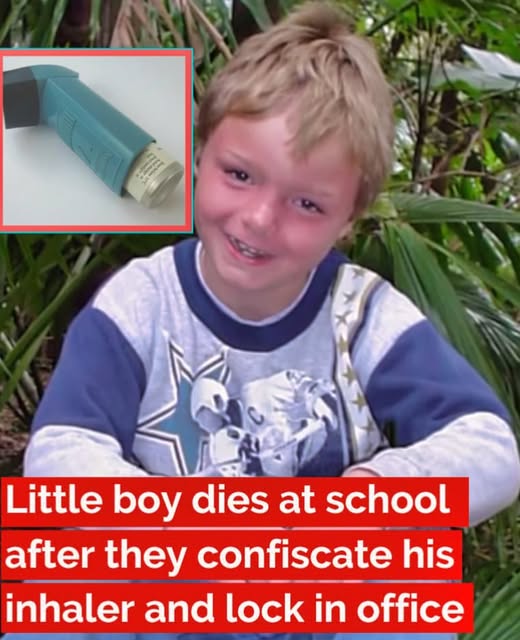Asthma is a serious and potentially life-threatening condition. Every attack carries the risk of becoming fatal if not treated in time. This reality was tragically highlighted by the heartbreaking story of 12-year-old Ryan Gibbons, whose untimely death has become a powerful symbol in the fight for asthma awareness and policy change.

Ryan was a lively and adventurous boy from Ontario, Canada. He had a passion for motorbikes and loved spending time hiking through the woods. Like many children his age, he was full of energy and curiosity, always eager to explore. But on an ordinary day in 2012, a series of preventable missteps cost him his life.
On October 9, Ryan went to school like any other seventh-grade student. He had no idea it would be his last day. During a game of soccer at school, Ryan suffered a sudden asthma attack. He desperately needed his inhaler to open his airways and allow him to breathe, but he didn’t have it on him. Instead, his medication was locked away in the principal’s office, completely out of his reach.
Despite previous efforts by his mother, Sandra Gibbons, and a doctor’s note explaining the importance of Ryan keeping his inhaler close, the school’s policy prohibited students from carrying their own rescue medication. Any spare inhalers Ryan brought were routinely confiscated. On the day of the attack, his friends tried to carry him to the office to retrieve the inhaler, but time ran out. Ryan lost consciousness and, tragically, was never revived.
The incident occurred at Elgin County School and shocked the entire community. Following an investigation, it was confirmed that the school enforced a strict policy requiring all medications to be stored in the office. Sandra Gibbons had long tried to advocate for her son’s right to carry his inhaler, but the school’s rigid rules overruled her concerns. She recalled being contacted several times by the school to pick up inhalers Ryan had brought, and each time, they were taken away.
“You would give him an inhaler, but then he would get caught with it, and it would be confiscated,” she explained in an interview with CBC. “Then I’d get a phone call. It was so frustrating. I didn’t understand why it had to be this way. I didn’t even realize at first that the policy required all medication to be stored in the office.”
Sandra’s grief was unimaginable. She had lost her only child to an attack that could have been prevented with basic common sense and flexibility in school policies. But instead of allowing her pain to consume her, Sandra turned her sorrow into a mission. She vowed to prevent other families from enduring the same tragedy.
Soon after Ryan’s funeral, Sandra began campaigning for legal reform. She launched a petition urging the Ontario government to adopt standardized asthma management policies for all schools. Working alongside Progressive Conservative MPP Jeff Yurek, she championed a private member’s bill that would allow students to carry their inhalers with them at all times, provided they had a doctor’s note.
“When Ryan passed away, it was like losing everything that I lived for,” Sandra told Allergic Living. “After burying my son, I knew this was a preventable attack. If people had the proper training and knew what to look for when a child is in distress, he would still be alive today.”
Her tireless advocacy led to a major victory. The bill, now known as Ryan’s Law (Bill 135), passed unanimously with support from all parties in the Ontario legislature. The law mandates that students with asthma are allowed to carry their inhalers in their pockets or backpacks while at school, so long as there is a supporting note from a healthcare provider.
“I’m definitely overwhelmed, very emotional, and very happy that it’s going to be implemented,” Sandra said after the law was passed.
The Asthma Society of Canada praised the new legislation. Dr. Rob Oliphant, the organization’s president at the time, emphasized that “it is essential that children with asthma have ready access to potentially life-saving asthma medications while at school.”
In the United States, all 50 states have laws that technically allow students to carry their inhalers. However, enforcement and implementation vary. In some schools, zero-tolerance drug policies have unintentionally led to the confiscation of inhalers. This disconnect between policy and practice continues to put children at risk.
Every day, more than 10 Americans die from asthma-related complications. Though asthma deaths have declined in recent years due to better awareness and treatment options, every single death remains one too many—especially when it could have been prevented by something as simple as timely access to an inhaler.
Ryan’s story is a painful reminder of the importance of flexibility, compassion, and practical policy in the school system. His passing was a devastating loss, but the impact of his story continues to save lives. Sandra’s courage and determination turned her personal tragedy into a national call to action, protecting countless children across Canada and inspiring reforms elsewhere.
For those who hear Ryan’s story, the takeaway is clear: asthma is not just an inconvenience. It is a medical condition that demands respect, understanding, and preparedness. Denying a child access to their medication—even for a moment—can have irreversible consequences.
Ryan’s Law stands not only as a legal safeguard but as a legacy to a boy who should still be here. It is a testament to what can be achieved when grief is transformed into purpose, and it offers hope that no more children will be lost due to outdated or misguided school policies.
Let’s remember Ryan by sharing his story. Let’s raise awareness about the importance of immediate access to asthma medications and ensure that schools everywhere are safe environments for children with chronic health conditions. Through continued education, advocacy, and compassion, we can help protect every child at risk. Ryan’s story, though deeply tragic, has already changed lives—and it will continue to do so as long as we keep telling it.





